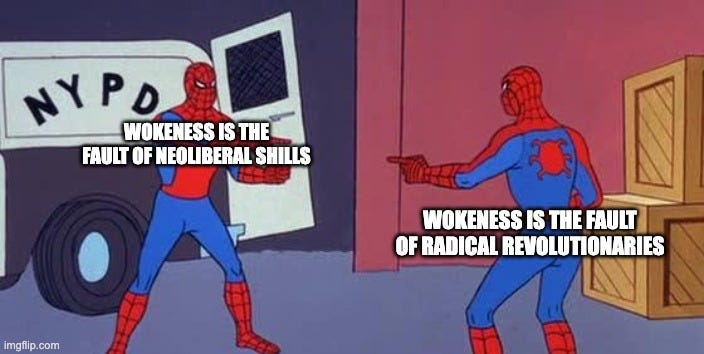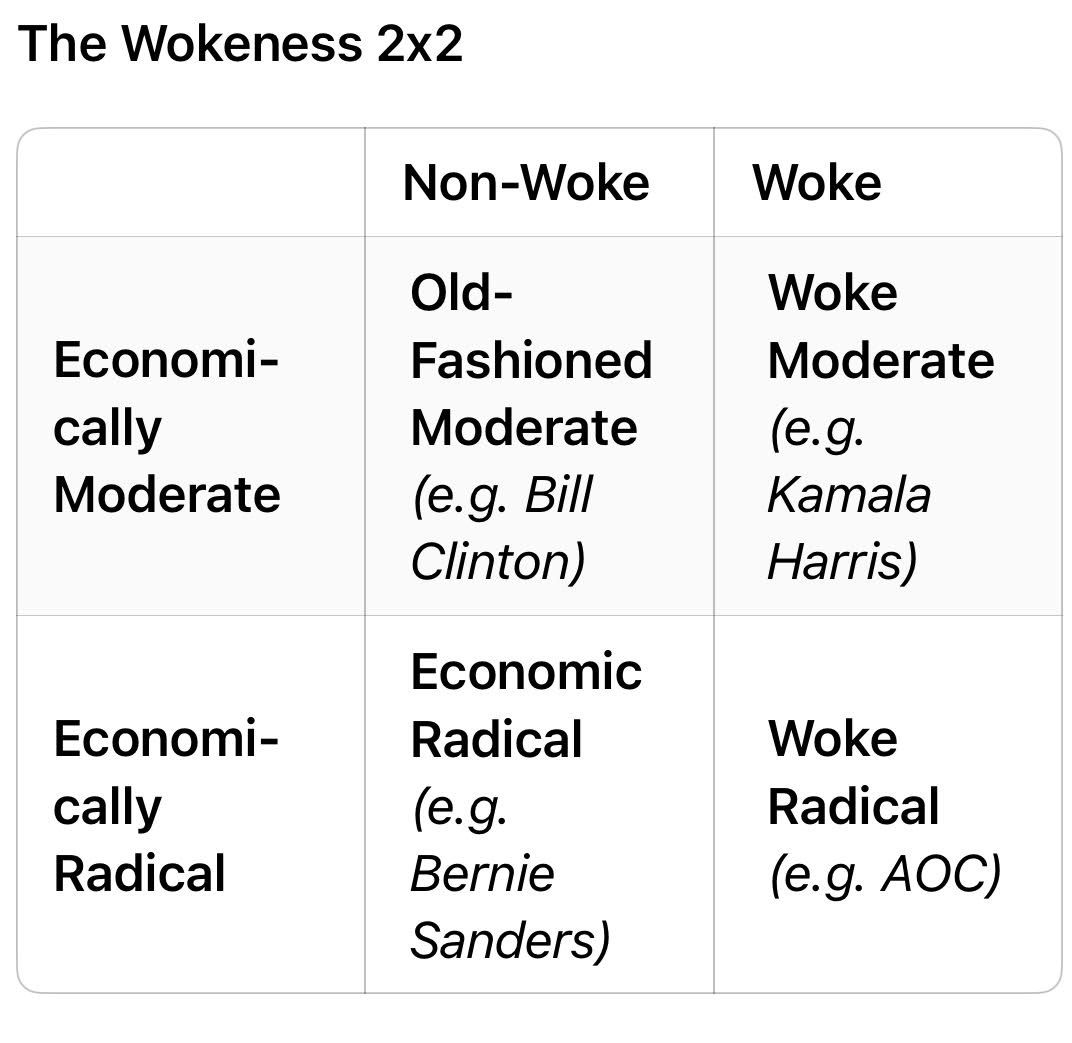Help Me Understand… Whether Wokeness Is the Fault of Moderates or Radicals
The third installment of the occasional feature in which I pose to all of you a question to which I genuinely want to learn the answer.
This series is quickly becoming one of my favorite parts of this Substack community! So I am once again opening this thread up for comment from everyone. As ever, a friendly reminder: Be nice to each other. Engage in good faith. You can express robust disagreement in polite terms.
And please do support my work—and get all my writing, plus ad-free access to full episodes of the podcast—by becoming a paying subscriber today.
Many progressives continue to deny that the left’s embrace of identitarianism helped Donald Trump win the election. That is a key reason why, as I argued last week, it is unlikely that Democrats will let go of wokeness anytime soon.
But even among those who do accept the damage that identitarian rhetoric and policies have done to the Democratic brand, a fierce debate has broken out. Moderates and radicals are pointing fingers, with each claiming that the other is the real reason why the party has proven so susceptible to these ideas.
One side claims that it is radicals like the members of the Squad who have introduced wokeness to the Democratic Party. Like James Carville, they locate the origins of the problem in the “faculty lounge politics” of radical college professors and extreme activists.
Others retort that it is “corporate Democrats” like Hillary Clinton and Kamala Harris who have appropriated wokeness for their own purposes. Aaron Regunberg, for example, has insisted that “Dumbass forms of identity politics didn’t come from the Bernie wing of the Democratic Party.” Tyler Austin Harper struck the same chord: “Woke shit [that] centrists now say they hate,” he claims, “was first amplified by centrists attempting to paint Bernie as racially insensitive and insufficiently intersectional.”
It seems to me that a humble conceptual tool can help to shed some light on this debate. Social scientists use the 2x2, which shows how a difference among two independent dimensions creates four distinct quadrants, so often that their fondness for it has become a running joke. But social scientists resort to 2x2s so often because they really can be clarifying. And what “The Wokeness 2x2” reveals is that there are four distinct camps within the left.
Left-wing politicians need to make two different choices: They either adopt identitarian attitudes on cultural issues which make how we treat people explicitly depend on the group into which they were born or stick to a more universalist (and often more class-conscious) framework for how to overcome discrimination and historical injustice. Separately, they either embrace the benefits of the market economy, arguing for meliorist policies like an expanded welfare state, or they oppose capitalism in a more fundamental way, perhaps going so far as to embrace the label of being a “socialist.” That results in four conceptual possibilities.
No living-and-breathing politician fits into a neat box, so labels for each of these camps are inescapably going to be somewhat simplistic. And yet, it seems to me that all four of these quadrants describe major political figures with real influence in the Democratic coalition:
Old-fashioned moderates: These are politicians that are both politically and culturally moderate. Bill Clinton is the obvious example. Others who arguably fit the bill include Seth Moulton or Jon Tester or (depending on how you interpret his presidency) Barack Obama.
Economic radicals: These are economic populists who often feud with moderate Democrats on economic questions but tend to prioritize questions of class over those of race. Bernie Sanders is an obvious example (at least if you focus on his 2016 campaign and discount his subsequent embrace of more identitarian aides and talking points). Though they are more economically moderate than Sanders, you could add politicians with a populist touch like Sherrod Brown and John Fetterman to the list.
Woke moderates: These are establishment politicians who are close to the “corporate wing” of the Democratic Party but frequently use identity-based appeals or vocabulary to further their agenda. Kamala Harris is an obvious example. But you might add others like Gavin Newsome or Catherine Cortez Masto to the mix.
Woke radicals: These are politicians who are radical on both the cultural and the economic dimensions. AOC remains the obvious example (though she has recently shown signs of moderating). Other members of the Squad, like Cori Bush and Ilhan Omar, also fit the bill.
This shows that the split about wokeness transcends the somewhat simplistic divide between moderates and radicals. There is resistance to wokeness both among moderates like Bill Clinton and among radicals like Bernie Sanders. Conversely, there are proponents of wokeness both among moderates like Kamala Harris and among radicals like AOC.
The fact that some moderate as well as some radical Democrats have embraced wokeness helps to clarify the terms of the debate. But it does not answer the substantive question. So… please help me settle the debate.
Who is more to blame for the rise of wokeness in the Democratic Party? Was it the woke radicals who succeeded in turning these fringe ideas mainstream? Was it the cynical embrace of these ideas by woke moderates that made them so dominant? Or do both wings of the party share equal responsibility?





I would say that both the woke moderates and the woke radicals are to blame for the general air of superiority and condescension. I was a solid Democrat voter of the NPR-listening variety (voted for Clinton, Nader, Kerry, Obama, Clinton, Biden, Harris) but got off the train when my faculty-lounge-friends (literally, I'm an English professor) told me that I was participating in "white supremacy." When ordinary acts of critical thinking got strange labels, I was done. I'm now a radical centrist, subscribing to periodicals like Persuasion (center left) and The Dispatch (center right). I saw the Democratic party go along with the faculty-lounge weirdness. My progressive friends got judgey and condescending about anyone who didn't see the world through their very narrow window. I still voted for Harris (not wanting Trump's authoritarian populism) but I was deeply annoyed that I didn't have a better choice. My analysis is that it started with woke radicals but then the moderates didn't have the backbone to resist. I blame them both.
I agree with many of the commenters here. However, I'd like to give a special shout-out to academia and mainstream media, two institutions where I once worked, as well as Hollywood and NGOs like the ACLU, Planned Parenthood, and the Southern Poverty Law Center, all of which have abandoned their primary missions.
I was once an NPR-listening, NYT-reading, Unitarian church "liberal." Now, I look at each of these places and wonder how they justify their biases. My "lived experience" of having mixed race children enables me to see the destructiveness of calling all white people "racist" while insisting things like being on time or writing well are signs of white supremacy (Yes, real comments said to me at a Unitarian Church).
I didn't vote for either Trump or Harris (left that part blank), but I completely understand why he won. The American cultural elite drank the kool-aid the far left is selling, and now they too are part of the problem. Until those places become more diverse in thought, the divisions will remain.